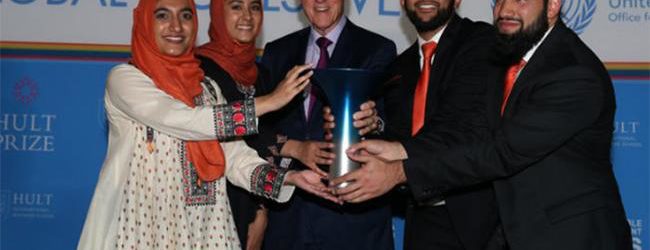
New York City:
Four students of Pakistani American descent won the coveted $1m Hult Prize in New York City last month. They were handed over their award by former US President Bill Clinton.
Recent graduates of the Rutgers University, Gia Lakhani, Hasan Usmani, Moneed Mian and Hanaa won seed funding for their transportation startup called Roshni Rides. The team devised a solution to provide affordable, readily available and reliable public transportation for informal settlements in the South Asian region. Customers have the option of using preloaded Roshni cards that act as tickets to ensure an efficient and uniform payment option.
The Hult challenge is one of the most prestigious awards for social entrepreneurs and enterprises and has gained considerable popularity in a very short span of time. The contest invites teams from all over the world to address pressing social issues centered around food and water issues, energy, climate change, sustainable growth and education.
This year’s contest on social ventures to address problems of people residing in informal settlements anywhere. After several rounds in the competition six finalists, including Team Roshni Rides and another team from Pakistan, pitched before a jury in New York to take the ultimate prize.
Roshni Rides had successfully raised around $30,000 through a crowd funding campaign to put their idea to practice in Karachi’s Orangi Town. The team felt that transportation was a major challenge for the informal communities because of lack of infrastructure and this resulted in poor access to hospitals, schools or workplaces. Due to poorly constructed roads even three wheeled rickshaws cannot make it to some of these localities and those that do often demanded often staggering fares.
Beginning with trying to build a solar powered electric rickshaw, the team ended up using ride sharing app for existing rickshaw fleets. This way the drivers could share rides and earn a higher income than what he could as an independent driver.
In the coming years, Roshni Rides hopes to use the prize money to expand the company. By 2022, they aim to have a fleet of 1,200 rickshaws across south Asia and serve 2.2 million refugees. If they meet that goal, the company is projected to make a profit of over $5 million a year through advertising revenue and fares.